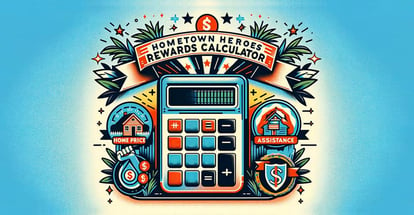Comprehensive Florida Real Estate Rebate List
Our Florida real estate rebate list is a detailed compilation of rebates available exclusively to buyers purchasing homes within the state of Florida.
This list serves as a resource to help potential homeowners understand the financial incentives they might be eligible for during the purchase process. These rebates stem from various programs, each having its own set of qualifications or criteria.
By referencing this list, buyers can effectively identify opportunities to maximize their financial benefits when entering Florida's real estate market.
What is a Real Estate Rebate?
In Florida, when you hear about a "cash-back rebate" in real estate, it means that a part of the money the real estate agent earns (their commission) is given back to the buyer at the end of buying a home.
This idea of giving a rebate became popular in Florida because agents wanted to attract more homebuyers by offering them a bit of money back.
Here's how it usually works - when someone sells their home in Florida, they pay a fee to both their own agent and the agent representing the buyer. This fee is based on a percentage of the home's selling price.
The special thing about a rebate is when the agent who helped the buyer offers to give a part of their fee back to that buyer.
The reason agents offer this rebate in Florida is for two main things.
First, it’s a way to encourage people to choose them over other agents. It's like a special deal that makes them stand out in a busy real estate market.
Second, it helps the buyer save some money. This saved money can be used to help pay for closing costs, upgrades to the home, or even be added to their down payment.

Advantages of Florida Real Estate Rebates
There are several good things about real estate rebates in Florida that make buying a home a bit easier. The biggest advantage is the chance to save money.
When buyers get some of the money back either from the price of the home or the closing costs, it reduces the amount they have to pay upfront. This makes it easier for many people in Florida to afford a home.
Because of the upfront savings, rebates can also let buyers think about homes that were just a little more expensive than they originally planned.
And this extra money can also help when discussing the final price of the house. Knowing there's a rebate coming can make buyers more flexible during these talks.
Another great thing about many of the rebate offers in Florida is they come from experienced real estate agents. Often, to get a rebate, buyers work with specific agents who are well-known and trusted in Florida.
This means that not only do buyers get some money back, but they also get to work with professionals who know the ins and outs of buying a home in Florida.
These agents, because they want to stand out and get more clients, might also offer even better services, making the whole process of buying a home smoother.
Florida Real Estate Rebate List
Our Florida real estate rebate list provides a comprehensive overview of rebates available to homebuyers in the state.
It serves as a resourceful guide, detailing the various programs and offers that can help reduce the financial burdens associated with purchasing a property in Florida.
Rocket Mortgage BUY+ Rebate
Rocket Mortgage has launched the BUY+ program, designed to offer clients a rebate on the purchase price of their home.
Specifically, clients can receive up to 0.5% of the home's purchase price, with a limit set at $10,000. This rebate is directed towards their closing costs.
A core component of the BUY+ program is its focus on linking clients with agents who have a deep understanding of the local area.
These agents, known as Rocket Homes Partner Agents, undergo a detailed vetting process before association. Their selection is based on set criteria, including feedback and ratings from past clients they've assisted.
The BUY+ program serves two main purposes. Firstly, it provides a mechanism for clients to potentially offset some of their closing costs through the rebate.
Secondly, it ensures that clients are paired with knowledgeable agents familiar with the local housing market. By doing so, the program aims to facilitate informed decision-making during the home buying process.
MakeFloridaYourHome Real Estate Buyer Rebate
Purchasing a home in Florida involves various costs, with one of the most significant being the initial down payment.
Typically, buyers are anticipated to produce at least 6.5% of a home's acquisition price upfront. This estimate includes the FHA's minimum down payment combined with the inevitable closing costs.
However, the Down Payment Assistance (DPA) program offers relief by financing 5% of this amount. This leaves buyers with a remaining 1.5% balance to settle.
This is where the MakeFloridaYourHome Buyer Rebate comes into play. By providing a 1% rebate on the home's purchase price, the financial responsibility for the buyer reduces substantially.
This rebate effectively diminishes the buyer's initial down payment requirement to a mere 0.5% of the home's total value.
For individuals striving for the ideal of no down payment, MakeFloridaYourHome extends additional support.
The platform guides buyers on how to obtain a seller rebate, which has the potential to offset the remaining 0.5%.
As a result, with the assistance of both the buyer and seller rebates combined, a buyer can achieve a situation where the down payment is essentially nullified, making homeownership more accessible.
This approach showcases MakeFloridaYourHome's commitment to facilitating smoother property transactions for Florida residents.
Zillow Real Estate Buyer Rebate
As of August 2023, Zillow no longer has a real estate buyer rebate program.
Redfin Real Estate Buyer Rebate
As of June 2022, Redfin no longer has a real estate buyer rebate program.
Comparing Florida Rebates
Rocket Mortgage's BUY+ Program and the MakeFloridaYourHome Buyer Rebate offer different advantages tailored to the specific needs of homebuyers.
With the BUY+ Program, clients have the opportunity to secure a rebate amounting to 0.5% of their home's purchase price, although it is limited to a maximum of $10,000. This rebate is explicitly designed to alleviate the expenses associated with closing costs.
Furthermore, the program prioritizes connecting clients with Rocket Homes Partner Agents. These agents undergo a meticulous vetting process and are selected based on commendations and ratings from prior clientele, ensuring homebuyers are paired with proficient agents well-versed in the local market dynamics.
In contrast, the MakeFloridaYourHome Buyer Rebate offers a more substantial rebate of 1% with no cap, primarily targeting the reduction of the buyer's initial down payment.
Through this rebate, the upfront down payment can be cut from 1.5% to just 0.5% of the home's total value.
Moreover, the program equips buyers with strategies to negotiate seller rebates, potentially negating the remaining 0.5% to realize a 0% down payment scenario.
While Rocket Mortgage concentrates on alleviating closing costs, MakeFloridaYourHome accentuates diminishing down payments.
If a buyer's primary concern is to minimize immediate expenditures, the MakeFloridaYourHome rebate could be more appealing.
The opportunity to effectively lower the down payment to 0% presents an enticing advantage, especially for those grappling with initial costs.
Although Rocket Mortgage's emphasis on experienced local agents is beneficial, the immediate fiscal relief from MakeFloridaYourHome might be a decisive element for numerous buyers.
Best Down Payment Assistance Programs in Florida
Real estate rebates are often paired with down payment assistance programs to reach affordable down payment and closing cost amounts.
Often times this combination can bring the total down payment for a home close to 0.
The Chenoa Fund Program
The Chenoa Fund Program operates nationwide, aiming to support individuals who struggle with down payments in their pursuit of homeownership. Administered by the Chenoa Fund, it introduces secondary financing options to aspiring homeowners.
What sets this program apart is its wide range of tailored product solutions, including both forgivable and repayable down payment assistance, as well as options with zero interest. The program is designed to align seamlessly with FHA loans.
To qualify, applicants must meet specific criteria.
A credit score of at least 620 is usually required, along with a debt-to-income (DTI) ratio not exceeding 50%.
Participants must also attend mandatory homeownership counseling sessions, providing them with valuable insights into various aspects of owning a home.
Additionally, there are financial constraints - an applicant's income should not surpass 115% of the median income of their area. The property purchased should also be the primary residence of the buyer.
While primarily focusing on first-time homebuyers, some offerings within the Chenoa Fund Program cater to individuals who have owned homes before.
Considering the diverse offerings within the program, it's essential for potential participants to thoroughly understand the terms and requirements associated with each option.
Florida Hometown Heroes Program
The Florida Hometown Heroes Program is an initiative sponsored by the state of Florida to assist its workforce in becoming homeowners. While the program's title may imply a focus on frontline workers, it encompasses all employed individuals within the state.
One of the prominent features of this program is its provision of financial support for down payments. Recognizing the program's impact, the state has upped the financial assistance limit to $35,000 for the 2023-2024 fiscal year.
A distinguishing element of the Florida Hometown Heroes Program is its commitment to enhancing community connections. The program endorses participants buying homes close to their employment locations, which not only reinforces a sense of community but also potentially reduces commuting durations.
There are several eligibility criteria in place.
Applicants should be purchasing a home for the first time, meaning they haven't been homeowners in the preceding three years. They are also required to have a credit score no lower than 640.
In terms of income, the program mandates that an applicant's earnings shouldn't exceed 150% of the median income of their county, as outlined by the U.S. Department of Housing and Urban Development (HUD).
Another pivotal condition is that applicants must be working for a Florida-based employer and have the intention of purchasing a residence in the same community as their workplace.
It's imperative for potential participants to note that even when all the criteria are met, acceptance into the program isn't assured due to its significant demand.
FHA Loans
Established by the Federal Housing Administration in 1934, the FHA loan program offers an alternative route to home financing distinct from conventional loans.
The program is widely recognized for its relatively lower down payment criteria, making it an attractive choice for first-time homebuyers and those without a substantial down payment reserve.
These loans come with a government backing, which decreases the lender's risk exposure. As a result, borrowers benefit from more relaxed qualifying standards.
FHA loan criteria:
-
Down Payment - For those holding a credit score of 580 and above, a down payment of just 3.5% of the home's value is expected. However, for scores ranging between 500 and 579, a 10% down payment is mandatory.
-
Credit Scores - While FHA loans accommodate a spectrum of credit scores, a score of 580 or above offers the advantage of the minimum down payment. Individuals possessing scores from 500 to 579 remain eligible, though the down payment requirement is increased.
-
Debt-to-Income Ratio (DTI) - As a standard practice, a borrower's monthly financial obligations should not exceed 43% of their monthly earnings. However, this is a flexible benchmark, and certain exceptions may apply based on individual circumstances.
-
Residency - The property purchased with an FHA loan must serve as the borrower's primary living space. This stipulation prevents the acquisition of investment properties or secondary residences using this loan type.
- Mortgage Insurance - FHA loan recipients have to cover two mortgage insurance costs - an upfront charge, typically around 1.75% of the borrowed amount, and an annual premium that varies between 0.45% and 1.05%.
Rocket Mortgage ONE+
Rocket Mortgage's ONE+ program offers a solution to reduce the initial financial strain of down payments for aspiring homeowners.
Under this scheme, applicants are required to contribute just 1% of the property's buying price for the down payment.
In addition to the participant's contribution, Rocket Mortgage provides a 2% grant, ensuring that the buyer immediately possesses a 3% equity in the property.
Contrary to numerous schemes centered around first-time buyers, the ONE+ initiative welcomes both novices and experienced home purchasers and is accessible nationwide.
A distinguishing characteristic of the ONE+ program is the elimination of the need for mortgage insurance premiums, a common feature in many conventional loans until the homeowner accumulates 20% equity in the property.
However, there are essential eligibility requirements for the program:
-
Income Limit - Prospective applicants' income should not exceed 80% of the median income of the location in which they intend to purchase. To provide a clearer picture, in an area with a median income of $90,800, the applicant's income threshold would be capped at $72,640.
-
Credit Requirement - Applicants must maintain a minimum FICO® Score of 620.
-
Property Type - The program is limited to single-unit properties intended to be the primary dwelling of the buyer.
- Equity Limit - The sum of the buyer's initial down payment combined with the grant from Rocket Mortgage must not go beyond 5% of the property's total value.
It's crucial for applicants to differentiate between overall income and qualifying income, as this distinction can significantly impact the application's outcome.
Bottom Line
Florida offers a variety of real estate rebates and down payment assistance programs to make homeownership more attainable.
Real estate rebates, such as the ones offered by Rocket Mortgage and MakeFloridaYourHome, help buyers reduce their initial expenses in the purchasing process. These rebates can either target closing costs or diminish down payments.
On the other hand, down payment assistance programs like the Chenoa Fund Program, Florida Hometown Heroes Program, and the FHA loans focus on helping potential homeowners meet the upfront costs.
Rocket Mortgage's ONE+ program further eases the financial burden by requiring a minimal down payment and providing a grant to the buyer.
These rebates and programs not only financially support buyers but also connect them with experienced real estate professionals, ensuring an informed and beneficial home buying experience in Florida.
Prospective homeowners should carefully evaluate each offer and assistance program to determine the best fit for their individual needs and financial situation.
With over 50 years of mortgage industry experience, we are here to help you achieve the American dream of owning a home. We strive to provide the best education before, during, and after you buy a home. Our advice is based on experience with Phil Ganz and Team closing over One billion dollars and helping countless families.

About Author - Phil Ganz
Phil Ganz has over 20+ years of experience in the residential financing space. With over a billion dollars of funded loans, Phil helps homebuyers configure the perfect mortgage plan. Whether it's your first home, a complex multiple-property purchase, or anything in between, Phil has the experience to help you achieve your goals.


 By
By  Edited by
Edited by 






